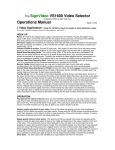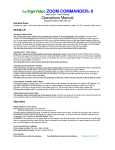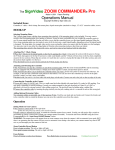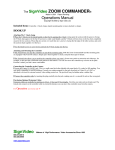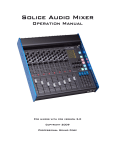Download Sign Video ENG-44 Operator`s manual
Transcript
ENG-44 Field Portable Audio Mixer Operator’s Manual SignVideo - 1226 SE Gideon Street - Portland, Oregon 97202 503.236.0000 www. signvideo.com Safety Warning Protect your ears. Always turn down the headphone volume before you connect your headphones and before you put on your headphones. When using the headphones, set headphone volume to the lowest practical level to guard against sudden loud noises or other changes in the sound level of the audio environment. Excessive headphone volume may be damaging to your hearing. Read this manual in its entirety before using or operating this product. ONE YEAR LIMITED WARRANTY Sign Video Ltd. warrants this product (including accompanying accessories) and all parts thereof, except as set forth below, for a period of one year from the original date of purchase. Should the product be found to be defective, Sign Video Ltd. will repair or replace the product at no charge. To obtain warranty service telephone one of the numbers below or log on www.signvideo.com to obtain the current telephone number for warranty repair. The duration of any implied warranties is limited to the duration of the express warranty herein. This warranty does not cover cosmetic damage or damage due to acts of god, accident, misuse, abuse, alteration, negligence, improper installation, tampering, criminal acts, negligence, lack of reasonable care, or if serviced or repaired by anyone other than Sign Video Ltd. or a repair facility authorized by Sign Video Ltd. Sign Video Ltd. shall not be liable for any loss of use, or incidental or consequential damages resulting from the use of this product or the failure or inoperability of this product in any respect, including from any cause whatsoever, or from breach of any express or implied warranty. In no event shall Sign Video Ltd. be liable for any amount in excess of the purchase price paid for the product, except to the extent prohibited by applicable law. Some states do not allow the exclusion or limitation of incidental or consequential damages, or permit limitations on how long an implied warranty lasts, so these exclusions and limitations may not apply to you. This warranty gives you specific legal rights and you may also have other rights which vary from state to state. Sign Video Ltd. (800) 373-8910 (503) 236-0000 © Copyright 2006 by Sign Video Ltd. 2 www.signvideo.com Note: This equipment has been tested and found to comply with the limits for a Class B digital device, pursuant to part 15 of the FCC Rules. These limits are designed to provide reasonable protection against harmful interference in a residential installation. This equipment generates, uses and can radiate radio frequency energy and, if not installed and used in accordance with the instructions, may cause harmful interference to radio communications. However, there is no guarantee that interference will not occur in a particular installation. If this equipment does cause harmful interference to radio or television reception, which can be determined by turning the equipment off and on, the user is encouraged to try to correct the interference by one or more of the following measures: Reorient or relocate the receiving antenna Increase the separation between the equipment and receiver Connect the equipment into an outlet on a circuit different from that to which the receiver is connected Consult the dealer or an experienced radio/TV technician for help Note also that changes or modifications to this equipment not expressly approved by Sign Video Ltd. could void your legal authority to operate this equipment. This Class B digital apparatus complies with Canadian ICES-003. Cet appareil numériqué de la classe B est conformé à la norme NMB-003 du Canada. 3 ENG-44 Front Panel 1. CH1-CH4 Gain Controls Individual gain controls for each of the four input audio channels, marked 1-4. Gain controls are also known as faders or level controls. 2. Master Gain Control Controls overall gain. 3. FLAT/Low Cut Filter Switches Switches for each of the four input channels select between flat (no filter) and 100 Hz roll off (attenuates audio in frequencies below 100 Hz). Use to reduce wind noise or other low frequency noise. 4. Pan Selectors Slide switches for each of the four input channels assign each input to either the left, right or both audio channels. (Select C position for both channels to place the audio in the center). 5. LED Audio VU Meter Two rows of LEDs light in progression to indicate level for both right and left audio channels. Use VU Meter Intensity Switch on the underside of the unit to select HIGH for high visibility outdoors or select LOW to conserve battery. 6. Other LED Indicators LIM Output Limiter LIM lights when limiter is triggered by audio level beyond a specified threshold which has been preset at the factory. The limiters compress the audio when this threshold is reached. Power EXT lights automatically when external power is being used. Power BAT lights automatically when battery power is being used. Low Battery Warning BAT flashes when battery needs to be replaced. Prior to this BAT will flash on audio peaks to offer early warning. NOTE: The unit is reverse voltage protected. No permanent damage can be sustained from reverse voltage. 7. Reference Tone Switch from MIX to TONE to generate 1KHz reference tone. 8. Slate Momentary push button activates slate mic located on front panel. Push and hold in while verbally identifying the audio take. Release to deactivate slate mic and continue with the take. 9. Head Phone Jack 1/8” jack for operator head phone monitoring. (Note that there is a separate XLR head phone jack for boom operator. See Right Panel.) Turn down headphone level control before connecting or putting on headphones. 10. Head Phone Level Control Adjusts head phone volume for both mixer operator and boom mic operator. Reduce volume before putting on headphones to protect your hearing. Use at lowest practical level to protect your hearing. 11. Tape Return Selector Slides from MIX to TAPE RETURN to allow head phones to monitor audio from video camera, tape recorder or other audio device. 12. Strap Ears Adjustable shoulder strap (included) attaches to these metal ears. 4 ENG-44 Left Panel MIC/LINE XLR Inputs Channel 1 through 4 XLR transformer balanced audio inputs. Use individual selector switches located on the underside panel of the unit to choose mic/line level for each input and to activate/ deactivate +48 volt phantom power for each input. For any given input, turn off phantom power if not specifically required by the microphone in use (using the switch on the underside of the unit). These XLR connectors are wired in the following manner: Pin 1: Ground (shield) Pin 2: Hot (in phase) Pin 3: Cold (out of phase) Phantom power for these XLR connectors is wired in the following manner: Pin 1: Ground Pins 2 & 3: carry 48 volts DC through 6.81K resistors when the particular input is switched to phantom power using the corresponding switch on the underside of the product. 5 ENG-44 Right Panel 1. Boom Head Phone Out XLR audio output for boom operator head phone monitoring. XLR output allows use of cable with XLR connectors rather than one with ¼” connectors. Use a ¼” adapter to connect to head phones. This way your spare XLR cable also serves as your spare boom operator cable, and you only need carry a small spare ¼” adapter. NOTE: The single head phone level control adjusts volume for both the boom head phone out and the front panel head phone out. 2. XLR Outputs 2 Balanced line level audio outputs. Use switch located on the underside panel of the unit to choose between mic and line level. 3. Line Out Line level 3.5 mm (1/8”) unbalanced audio output jack. Can be used to feed audio to cameras that only provide a 3.5 mm audio input jack. This is not recommended when using cables longer than a few feet. For longer cables runs to camera see the Using an XLR-Pro™ Adapter section of this manual. 4. Mic Out Microphone level 3.5 mm (1/8”) unbalanced audio output jack. Can be used to feed audio to cameras that only provide a mic level 3.5 mm audio input jack. This is not recommended when using cables longer than a few feet. For longer cables runs to camera see the Using an XLR-Pro™ Adapter section of this manual. 5. Auxiliary In 3.5 mm (1/8”) unbalanced audio input jack 6. Tape Return In 3.5mm (1/8”) unbalanced audio input jack for connection to video camera, tape recorder or other audio device. 7. Power on/off Switch 6 ENG-44 Rear Panel 1. External Power 2.1mm ID x 5.5mm OD external power jack. While this unit can operate fully on battery power, this input allows the unit to also be powered from a wall power outlet by using a power adapter. Plug the AC power adapter itself into the wall outlet, then connect the AC adapter’s low voltage DC output cord to this input jack. Note that power automatically switches to external when external power is supplied, and back to battery when external power is removed. 2. Battery Compartment Slide out drawer holds four AA batteries. 7 ENG-44 Underside Panel 1. Mic/Line Switches Individual switches for each input channel select between mic and line level in. One switch for both xlr outputs switches between mic and line level out. 2. Phantom Power Switches Individual switches for each input channel activate/deactivate +48 Volt phantom power. Some microphones require phantom power to operate. However, do not apply phantom power except for microphones that are equipped to operate on phantom power. Check the microphone operating manual if you are not certain. For phantom power XLR connector wiring, see Right Panel section of this manual. 3. VU Meter Intensity Switch Controls brightness of VU meter LED display located on the front panel. Select HIGH for high visibility outdoors,. Select LOW to conserve battery. 4. Tape Return Level Control Adjustable amplifiers allow matching to the vast majority of video cameras and other recording equipment for monitoring tape confidence heads. Use a small flat blade or phillips screwdriver to adjust the level for the best match. Many consumer/prosumer DV camcorders may not provide tape confidence heads. However, tape return is still valuable for checking for bad cable connections etc. 5. Feet These are supplied to protect the unit from wear for table top use. If you wish to remove the feet, it is okay to remove the feet and reinstall the existing screws. While they will screw further into the unit without the feet, they will not damage anything. 8 ENG-44 Specifications Country of Manufacture: USA Input Impedance: 2K, transformer balanced Output Impedance : 600 Ohms (both balanced and unbalanced line level outputs) Frequency Response: 20Hz to 20kHz +/- 1.5dB Distortion: <.1% (1kHz @ 0dBu output) Noise: -126dBu EIN Overall Gain: 66dB Output Clipping level: >22dBu Low Cut Filters: 100 Hz, -6db/octave roll off Tone Oscillator: 1kHz, +/- 5%, <0.2% THD (@ 0dBu) Aux Input: unbalanced line level, input impedance of 47K Ohms, AC coupled, via stereo 1/8" (3.5mm) jack Tape Return: input impedance 10K, Left/Right input levels independently adjustable Headphone Output: 10 Ohms output impedance Phantom Power: +48VDC "48PH", individually switchable, 14mA maximum (total of all microphones) Battery Life: 14 hours normal mixer operation Internal Power: 4X "AA" batteries; Alkaline (recommended) or rechargeable NiMH (charging unit not included) External Power: 9-18 VDC via 2.1 x 5.5mm coaxial power plug; center positive; input protected against reversed polarity Size: 1.5"x10.5"x6.5" (HxWxD), exclusive of detachable strap "ears" Weight: 2.25 lbs (1.0kg) w/ alkaline batteries Using an XLR-Pro™ Adapter to connect balanced audio to your consumer/ prosumer video camera Many consumer/prosumer camcorders only offer an unbalanced 3.5mm (1/8”) audio input. While you can connect directly to this input from the mixer using the mixer’s 3.5mm unbalanced audio output jack, this is not recommended for cable runs longer than a few feet. This is because long unbalanced audio lines tend to pick up noise. The longer the line, the worse the problem may be. To avoid this problem, you can purchase a SignVideo XLR-Pro™ Audio Adapter and connect it to your camcorder. Then you can feed a balanced audio signal from the XLR outputs of the mixer to the XLR inputs of the XLR-Pro™ and use as long a cable as you need. The XLR-Pro™ provides an output cable with 3.5mm stereo jack that can be directly connected to the camcorder. 9









